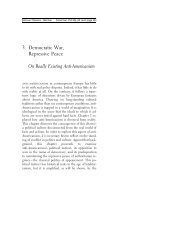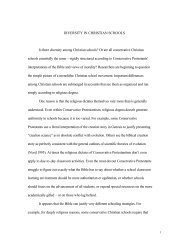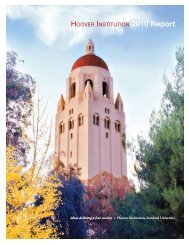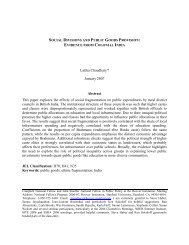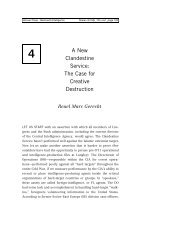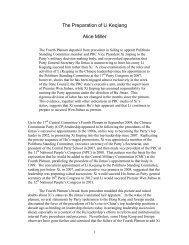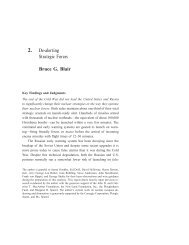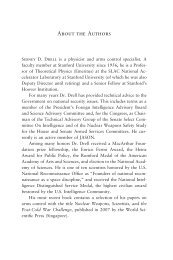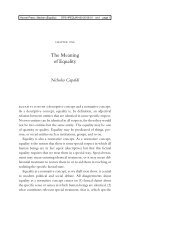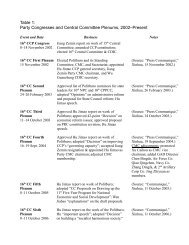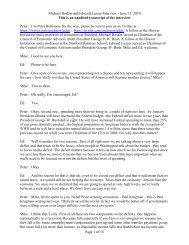Civil Liberties and Security in Cyberspace - Hoover Institution
Civil Liberties and Security in Cyberspace - Hoover Institution
Civil Liberties and Security in Cyberspace - Hoover Institution
You also want an ePaper? Increase the reach of your titles
YUMPU automatically turns print PDFs into web optimized ePapers that Google loves.
<strong>Hoover</strong> Press : Cyber DP5 HPCYBE0500 06-11-:1 11:53:04 rev1 page 188<br />
188 Ekater<strong>in</strong>a A. Drozdova<br />
Protection of privacy has evolved historically through <strong>in</strong>ternational<br />
<strong>and</strong> domestic law. Privacy is a fundamental human right recognized<br />
by the 1948 Universal Declaration of Human Rights <strong>and</strong> many<br />
other <strong>in</strong>ternational <strong>and</strong> regional <strong>in</strong>struments <strong>and</strong> treaties. 6 The Universal<br />
Declaration proclaims that “no one shall be subjected to arbitrary<br />
<strong>in</strong>terference with his privacy, family, home or correspondence,<br />
nor to attacks upon his honour <strong>and</strong> reputation,” <strong>and</strong> “everyone has<br />
the right to the protection of the law aga<strong>in</strong>st such <strong>in</strong>terference or<br />
attacks.” 7 It also states that “everyone has the right to freedom of<br />
op<strong>in</strong>ion <strong>and</strong> expression; this right <strong>in</strong>cludes freedom to hold op<strong>in</strong>ions<br />
without <strong>in</strong>terference <strong>and</strong> to seek, receive <strong>and</strong> impart <strong>in</strong>formation <strong>and</strong><br />
ideas through any media <strong>and</strong> regardless of frontiers.” 8 These provisions<br />
create the basic <strong>in</strong>ternational law framework for the right to<br />
privacy, which extends to cyberspace. 9<br />
On the national level, privacy is protected through a comb<strong>in</strong>ation<br />
of constitutional <strong>and</strong> legislative <strong>in</strong>struments <strong>and</strong> self-regulation.<br />
Nearly every country <strong>in</strong> the world recognizes a constitutional right to<br />
privacy, <strong>in</strong>clud<strong>in</strong>g at least the rights to <strong>in</strong>violability of home <strong>and</strong> secrecy<br />
of communications. Some recently written constitutions, such<br />
as those of South Africa <strong>and</strong> Hungary, conta<strong>in</strong> rights to access <strong>and</strong><br />
control of one’s personal <strong>in</strong>formation. In countries where the right to<br />
6. The Universal Declaration of Human Rights, UN GA Res. 217A (III) (1948)<br />
<strong>and</strong> the International Covenant on <strong>Civil</strong> <strong>and</strong> Political Rights, UN GA Res. 2200A<br />
(XXI) (1966, entry <strong>in</strong>to force 1976), oblige state signatories to adopt legislative <strong>and</strong><br />
other measures to protect aga<strong>in</strong>st unlawful <strong>and</strong> arbitrary <strong>in</strong>terference with <strong>and</strong> attacks<br />
on privacy by state authorities or natural or legal persons. The 1950 European Convention<br />
on Human Rights (Council of Europe, European Treaties, ETS No. 5) is a<br />
b<strong>in</strong>d<strong>in</strong>g treaty that obligates its signatories to protect privacy <strong>in</strong>terests, such as the<br />
right to private <strong>and</strong> family life, home, <strong>and</strong> correspondence,<strong>and</strong> enforces this obligation<br />
through the European Court of Human Rights. A state, person, nongovernmental<br />
organization or group of <strong>in</strong>dividuals claim<strong>in</strong>g to be a victim of a violation by a<br />
contract<strong>in</strong>g party may apply to the court for redress.<br />
7. Universal Declaration of Human Rights, art. 12.<br />
8. Ibid., art. 19.<br />
9. Ste<strong>in</strong> Schjolberg, Chief Judge, Moss Byrett City, Norway, “Legal Mechanisms<br />
for International Cooperation—Protect<strong>in</strong>g Privacy <strong>and</strong> Other Rights,” presentation<br />
at the Stanford Conference, December 6–7, 1999.



